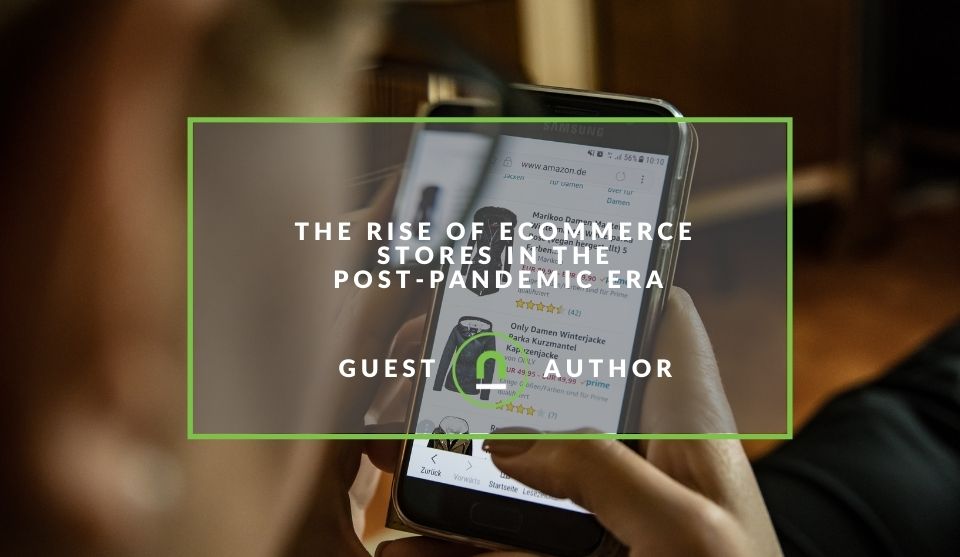Recent posts

Industry Experts
A Comprehensive Guide to Flyer Design: Digital & Physical Distribution
26 December 2024

Money Talks
Why Is There A Surge in Bitcoin Adoption in South Africa
24 December 2024

Money Talks
How To Safely Open Forex Trading Accounts in 2024
18 December 2024

Mind, Body & Soul
Understanding Cannabis in Modern Wellness
12 December 2024
Popular posts
Extravaganza
Trending Music Hashtags To Get Your Posts Noticed
24 August 2018
Geek Chic
How To Fix iPhone/iPad Only Charging In Certain Positions
05 July 2020
Extravaganza
Trending Wedding Hashtags To Get Your Posts Noticed
18 September 2018
Money Talks
How To Find Coupons & Vouchers Online In South Africa
28 March 2019
The Rise of Ecommerce Stores in the Post-Pandemic Era
10 September 2021 | 0 comments | Posted by Lucy Jones in Shopaholics
Ecommerce refers to any business transaction executed online. Its most popular example is online shopping that is defined as the purchasing and selling of goods through the Internet with the help of any device. However, eCommerce also entails other activities like internet banking, payment gateways, online ticketing, and auctions.
Mobile commerce, or m-commerce, as it is popularly known, is driven by the growing market in 2021 today, with the impact of smartphones and millennials' comfort when it comes to shopping online.
It is the fastest increasing retail market projected to hit about $4.135 trillion in sales last year in 2020. In 2018, the m-commerce industry alone witnessed a 39.1% increase in sales compared to the figures recorded in 2017.
What are the different business models under eCommerce?
Ecommerce has been classified into three models based on the nature of participants involved in the online transaction. They are-
- B2B
- B2C and
- C2C
Let us take a look at them below
Business to business or B2B
This is a model where businesses sell to other businesses. For example, stationery stores that sell office supplies in bulk to a business. Generally, B2B companies offer a discounted price per unit if the customers buy these supplies in bulk. This, of course, motivates a lot of offices as they can save costs on their purchases.
Business to consumer or B2C
This is the most common business model where merchants sell items to consumers who purchase a small volume of the produce. For instance, the example of a B2C model in supermarkets where consumers purchase their weekly groceries and generally do not buy anything in bulk there.
Consumer to consumer or C2C
This is a relatively new business model where consumers who have purchased something seek to resell the good to another customer. These transactions are generally executed on marketplaces like Craigslist and eBay. The selling process here is simple, and it is lucrative for those items that you no longer wish to keep or use anymore.
What are the advantages of eCommerce storefronts?
In the past few years, eCommerce has witnessed explosive growth. Today, the Internet has become indispensable in a pandemic-stricken world and a need in life. Businesses, too, have learned to take advantage of eCommerce, and some of the notable benefits of its presence have been listed below.
A global marketplace
Every physical store will always be restricted by the geographical region it serves. An online store, on the other hand, can cater to the whole world. Experts from the leading name in database management, administration, and consulting, RemoteDBA.com, say that the transition from a local customer base to a global marketplace entails no extra cost. In 2018, about 11.9% of retail sales were generated from purchases made online, and this trend will increase further in 2021 and beyond.
24/7 availability
Another great advantage of eCommerce businesses is they are always open 24/7. For merchants, this means a large increase in selling opportunities. For the customer, it is a more convenient and instant option available when the need for an item arises at any time of the day or night. Ecommerce businesses have no holidays, and they cater to their customers 24/7 x 365 days.
Decreased costs
Ecommerce businesses have reduced operating costs as there is no requirement for a company to hire staff for sales or maintain a physical store. A majority of the eCommerce costs go into product storage and warehousing. Those that operate a dropshipping business can enjoy even reduced upfront investment costs. They can enjoy better discounts and deals given to their customers.
Management of their inventory
Ecommerce businesses can enjoy automated inventory management advantages by deploying electronic tools for accelerating orders, delivery, and payment processes. It saves businesses billions of dollars when it comes to the maintenance of inventory and operational costs.
Targeted marketing
Businesses get access to a wealth of customer data and the opportunity to monitor their customer buying patterns and habits. They also get to know the industry trends that are emerging in the market. This helps eCommerce businesses to remain agile and customize their business marketing efforts to offer a personalized experience to their customers to attract potential ones.
Just imagine for a moment that you get the chance to address all of your customers by their first names and give them the human touch. This surely gives you a strategic edge over your peers who do not have e-commerce stores online. You should be aware of the latest eCommerce trends to create a strong presence in the market with success.
Serve niche markets
Operating brick and mortar businesses are tough, and the challenge has increased in the post-pandemic era. Scaling any niche product to become highly popular entails a lot of effort. When your business taps into the global marketplace, brick and mortar businesses need to invest massively.
However, eCommerce retailers, on the other hand, create an intensely profitable niche business without additional investments. With the aid of online search tools, customers from every corner of the globe can find and buy the products you sell.
Work from any place
Operating an eCommerce store means you do not have to be present in your office from 9 to 5 daily, nor do you need to suffer from the ordeal of commuting to and from your office daily. All you need is a good Internet connection and a device to allow you to manage your business from any place in the world with success.
When planning to set up your eCommerce storefront, you must consult trained and qualified database administrations for the site and its maintenance. Your eCommerce storefront needs to be operational 24/7, and in case there is downtime due to technical glitches, your customers will suffer.
This will earn your business a bad name in the market. It is prudent for you to have skilled and experienced database administrators to maintain your online store. The data should be protected and the site up and running 24/7 x365 days without hassles.
Tell us your story
Would you like to write for nichemarket just like Lucy has? Find out how to submit a guest post, and when you're ready, you can contact us.
Contact us
If you're unsure about setting up an eCommerce site, then feel free to reach out to us for a consultation and we'd be happy to assist you. We've built several eCommerce sites for both local and international clients and we're able to provide customised offerings to suit your needs and budget.
Are you looking to promote your business?
South African retail business owners can create your free business listing on nichemarket. The more information you provide about your business, the easier it will be for your customers to find you online. Registering with nichemarket is easy; all you will need to do is head over to our sign up form and follow the instructions.
If you require a more detailed guide on how to create your profile or your listing, then we highly recommend you check out the following articles.
Recommended reading
If you enjoyed this post and have a little extra time to dive deeper down the rabbit hole, why not check out the following posts about eCommerce.
- Choosing the Right Ecommerce Platform for Your Business
- 10 Crucial Magento Mistakes to Avoid When Selling Online
- How To Bootstrap Your eCommerce Businesses
- 10 Emails Every eCommerce Site Should Have
- What Does An SEO Optimised eCommerce Product Detail Page Look Like
- Get More Sales On Your eCommerce Site With Shopping Ads
- 10 Easy Marketing Ideas For eCommerce Sites
- How eCommerce Sites Sabotage Their SEO
- Tips To Create a Profitable eCommerce Landing Page
Tags: eCommerce, Guest Post
You might also like
How AI Search Engines Will Monetise
09 December 2024
Posted by Che Kohler in nichemarket Advice
An early look into how LLM-powered search engines need to monetise and drive revenue if they plan to stick around when AI-investing by VCs start to d...
Read moreUnderstanding Cannabis in Modern Wellness
12 December 2024
Posted by Alina Jones in Mind, Body & Soul
Cannabis is revolutionizing wellness, offering natural solutions for pain, stress, and holistic health through innovative, science-backed approaches ...
Read more{{comment.sUserName}}
{{comment.iDayLastEdit}} day ago
{{comment.iDayLastEdit}} days ago
 {{blogcategory.sCategoryName}}
{{blogcategory.sCategoryName}}

